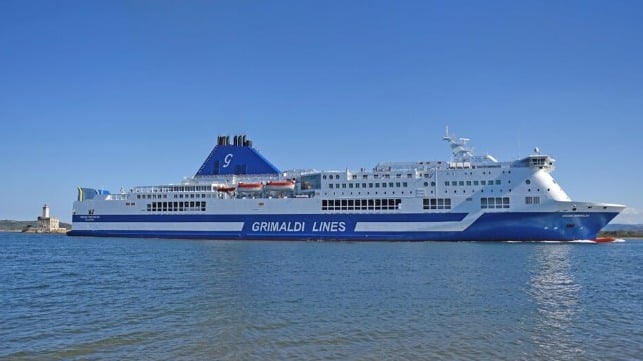Using Exhaust Scrubbers to Filter Microplastics from the Ocean

The shipping industry is stepping up to address the challenge of reducing the levels of microplastics captured in the world’s oceans. In the latest development, Italy’s Grimaldi Group announced that it has tested and patented a filter system to tackle ocean microplastics using the washwater already being employed in exhaust gas scrubbers commonly installed on a broad range of ships. Wartsila, one of the leading manufacturers of scrubbers, has become the first company to obtain a non-exclusive license from Grimaldi for the development and marketing of the plastics filter system for exhaust scrubbers.
The challenges of microplastics are well known with multiple efforts exploring different means of either preventing plastic from entering the ecosystem or capturing the plastics which are growing exponentially in the world’s oceans. The non-profit group Plastics Europe highlights that more than 11 million tons of plastics end up in the oceans each year. Larger plastics break down in the waves and sunlight into microscopic particles in the water as well as the seabed.
To tackle this problem, Grimaldi began exploring the exhaust scrubbers already widely installed on their fleet of ro-ros, ferries, and other cargo vessels. Open loop scrubbers suck in enormous quantities of water every day explains Grimaldi and then return it to the sea. The idea was to insert a new system that filters the water and captures the microplastics, preventing them from being ingested by fish and other marine organisms and entering the food chain.
“The idea for this innovative technology originated from recognizing that open loop exhaust gas cleaning systems can draw seawater for exhaust scrubbing and simultaneously collect microplastic present in the oceans as part of their normal operation,” said Emanuele Grimaldi, Managing Director of the Grimaldi Group. “We have already completed pilot testing of this system onboard one of our vessels deployed between Civitavecchia and Barcelona. The results are promising, with 64,680 microplastic particles collected on a single voyage between these two ports.”
According to Wartsila, the new system requires very few changes to onboard procedure and uses the natural capabilities of an open loop scrubber to contribute to cleaning the oceans during each voyage. Currently, a 10-megawatt engine will permit scrubbers to process approximately 450 m3 of water per hour, potentially resulting in a large amount of microplastics being captured from seawater. According to early test results, the microplastics filtration system is efficient in capturing particles smaller than 10µm and the captured concentration by volume equals around 76 particles/m3.
“Microplastics are a pressing environmental challenge and we’re proud to work together with Grimaldi to tackle cleaning up the oceans,” said Tamara de Gruyter, President of Marine Systems at Wärtsilä. “Even more importantly, the ability to capture microplastics shows how scrubbers are a platform for solving a wide range of sustainability challenges – and now even ones that are beyond the stack.”

that matters most
Get the latest maritime news delivered to your inbox daily.
While Grimaldi Group patented the system, the company notes that it is being made available with non-exclusive licensing agreements. In addition, they committed to donate the revenues from the licensing of the patent to charity.
Other shipping companies have also been looking at using their ships to act as filters. Starting in late 2020, Japan’s Mitsui O.S.K. Lines began testing adding a filter to its ballast water systems. MOL tested a filter on one of its wood chip dry bulk carriers and reported that they would expand the use of the technology to additional ships.
